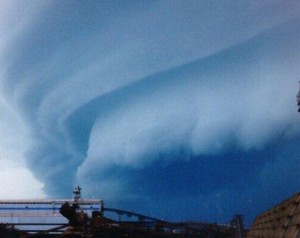 Months beginning from June to November are notorious for being the most turbulent season in the Atlantic. Just recently, hurricane Lee hit Louisiana, barreling its way with heavy downpour and maximum sustained winds of 75 km/h. But it pales in comparison to Hurricane Irene that smashed into Carolina to Maine just a couple of days earlier where more than 40 people lost their lives. While those affected are still in the process of recuperation, another sinister hurricane looms somewhere in the Atlantic.
Months beginning from June to November are notorious for being the most turbulent season in the Atlantic. Just recently, hurricane Lee hit Louisiana, barreling its way with heavy downpour and maximum sustained winds of 75 km/h. But it pales in comparison to Hurricane Irene that smashed into Carolina to Maine just a couple of days earlier where more than 40 people lost their lives. While those affected are still in the process of recuperation, another sinister hurricane looms somewhere in the Atlantic.
What is the difference between hurricane and typhoon?
If an extraordinary weather disturbance is characterized by continuous blowing of winds up to 34 knots or (39 mph), it is already forming a tropical cyclone. Different places of the world have their own words to mean a phenomenal storm or cyclone with winds that blow about 47mph or higher.
In Central and North America for instance, they call this phenomenal occurrence as hurricane. This is based on the Carib’s evil god called “Hurican” simply because of its destructive power.
In Northwest Pacific however, they call it a typhoon. In Southwest Pacific Ocean and Southeastern Indian they are calling it severe tropical cyclone and severe cyclonic storms as it is named by the North Indian Ocean people.
Winds that blow above 96kn/ 111 mph are already called intense hurricanes. On the other hand, when a typhoon reaches 132kn/ 150mph it becomes a super-typhoon. No matter how much variety of names it has, people must prepare for it since they are known for their devastating effects on property and life.
How does a hurricane, typhoon or cyclone get its name?
We all know what these words mean, but have we ever thought how they got into our dictionaries? Some etymologies refer to a Spanish word which means “God of Evil.” It was later on discovered that the word hurricane was derived from the name of the Storm God in Mayan mythology – “Hurakan.” In some accounts, his name was also spelled Harakan, Huracan, or Hurrican. The use of such word might have been linked to some records of encounter with a mighty storm and shipwrecks during the expedition of the West Indies.
Half a world apart, a different kind of word is used to mean the same thing. The word “typhoon” comes from the Chinese “tai feng” which means “supreme winds.” In Greek it appears that the English word is nothing more than a transliteration of “tuphon” which means whirlwind or hurricane.
When and where did the most destructive hurricane occur?
The Great Hurricane of 1780 still holds the record as the deadliest of all Atlantic hurricanes. During its weeklong rampage, the storm stripped every American state on its path and caused destruction to vast numbers of property, infrastructure and untold deaths in history. The aftermath left the affected areas in shambles with more than 20,000 dead and tens of thousands injured or homeless.
Recommended Articles:






